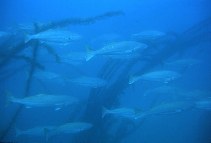Atractoscion nobilis (Ayres, 1860)
White weakfish
Add your observation in Fish Watcher
| Native range | All suitable habitat | Point map | Year 2050 |

|
| This map was computer-generated and has not yet been reviewed. |
| Atractoscion nobilis AquaMaps Data sources: GBIF OBIS |
Upload your photos and videos
Pictures | Google imageAtractoscion nobilis
Picture by Steele, M.A.
Pictures | Google imageAtractoscion nobilis
Picture by Steele, M.A.
United States (contiguous states) country information
Common names:
Seatrout, Tilpuuk, White seabass
Occurrence: native
Salinity: marine
Abundance: | Ref:
Importance: commercial | Ref: Clemens, W.A. and G.V. Wilby, 1961
Aquaculture: | Ref:
Regulations: | Ref:
Uses: gamefish: yes;
Comments: Uncommon north of San Fransisco (Ref. 6885). Also Refs. 4925, 11484.
National Checklist:
Country Information: https://www.cia.gov/library/publications/resources/the-world-factbook/geos/us.html
National Fisheries Authority: http://www.nmfs.gov
Occurrences: Occurrences Point map
Main Ref: Eschmeyer, W.N., E.S. Herald and H. Hammann, 1983
National Database:
Occurrence: native
Salinity: marine
Abundance: | Ref:
Importance: commercial | Ref: Clemens, W.A. and G.V. Wilby, 1961
Aquaculture: | Ref:
Regulations: | Ref:
Uses: gamefish: yes;
Comments: Uncommon north of San Fransisco (Ref. 6885). Also Refs. 4925, 11484.
National Checklist:
Country Information: https://www.cia.gov/library/publications/resources/the-world-factbook/geos/us.html
National Fisheries Authority: http://www.nmfs.gov
Occurrences: Occurrences Point map
Main Ref: Eschmeyer, W.N., E.S. Herald and H. Hammann, 1983
National Database:
Common names from other countries
Classification / Names Common names | Synonyms | Catalog of Fishes(genus, species) | ITIS | CoL | WoRMS | Cloffa
Teleostei (teleosts) > Eupercaria/misc (Various families in series Eupercaria) > Sciaenidae (Drums or croakers)
Etymology: Atractoscion: Greek, atraktos, arrow + Greek, skion, skiaina = barbel, red mullet (Ref. 45335).
More on author: Ayres.
Etymology: Atractoscion: Greek, atraktos, arrow + Greek, skion, skiaina = barbel, red mullet (Ref. 45335).
More on author: Ayres.
Environment: milieu / climate zone / depth range / distribution range Ecology
Marine; demersal; depth range 0 - 122 m (Ref. 2850). Subtropical; 65°N - 22°N
Distribution Countries | FAO areas | Ecosystems | Occurrences | Point map | Introductions | Faunafri
Eastern Pacific: Alaska to southern Baja California, Mexico and the Gulf of California.
Size / Weight / Age
Maturity: Lm ? range ? - ? cm
Max length : 166 cm TL male/unsexed; (Ref. 40637); common length : 100.0 cm TL male/unsexed; (Ref. 9118); max. published weight: 41.0 kg (Ref. 2850); max. reported age: 20 years (Ref. 56049)
Max length : 166 cm TL male/unsexed; (Ref. 40637); common length : 100.0 cm TL male/unsexed; (Ref. 9118); max. published weight: 41.0 kg (Ref. 2850); max. reported age: 20 years (Ref. 56049)
Short description Identification keys | Morphology | Morphometrics
Dorsal spines (total): 10 - 11; Dorsal soft rays (total): 20 - 23; Anal spines: 2; Anal soft rays: 8 - 9; Vertebrae: 24. Pelvic fins with fleshy appendage at base.
Often in schools over rocky bottom and in kelp beds (Ref. 2850). Also found in the surf zone (Ref. 2850). Young in bays and along sandy beaches (Ref. 2850). Feed on fishes, squids, and crayfish (Ref. 6885). Pelagic spawners (Ref. 56049). Excellent food fish (Ref. 9118).
Life cycle and mating behavior Maturity | Reproduction | Spawning | Eggs | Fecundity | Larvae
Pelagic spawner (Ref. 56049).
Main reference
Upload your references | References | Coordinator | Collaborators
Eschmeyer, W.N., E.S. Herald and H. Hammann, 1983. A field guide to Pacific coast fishes of North America. Boston (MA, USA): Houghton Mifflin Company. xii+336 p. (Ref. 2850)
IUCN Red List Status (Ref. 130435: Version 2024-1)
Least Concern (LC) ; Date assessed: 03 September 2019
Threat to humans
Harmless
Human uses
Fisheries: minor commercial; gamefish: yes
FAO(Fisheries: production; publication : search) | FishSource | Sea Around Us
More information
Population dynamics
Growth parameters
Max. ages / sizes
Length-weight rel.
Length-length rel.
Length-frequencies
Mass conversion
Recruitment
Abundance
Growth parameters
Max. ages / sizes
Length-weight rel.
Length-length rel.
Length-frequencies
Mass conversion
Recruitment
Abundance
Life cycle
Reproduction
Maturity
Fecundity
Spawning
Spawning aggregations
Eggs
Egg development
Larvae
Larval dynamics
Reproduction
Maturity
Fecundity
Spawning
Spawning aggregations
Eggs
Egg development
Larvae
Larval dynamics
Anatomy
Gill area
Brain
Otolith
Gill area
Brain
Otolith
Physiology
Body composition
Nutrients
Oxygen consumption
Swimming type
Swimming speed
Visual pigments
Fish sound
Diseases & Parasites
Toxicity (LC50s)
Body composition
Nutrients
Oxygen consumption
Swimming type
Swimming speed
Visual pigments
Fish sound
Diseases & Parasites
Toxicity (LC50s)
Genetics
Genetics
Heterozygosity
Heritability
Genetics
Heterozygosity
Heritability
Human related
Aquaculture systems
Aquaculture profiles
Strains
Ciguatera cases
Stamps, coins, misc.
Aquaculture systems
Aquaculture profiles
Strains
Ciguatera cases
Stamps, coins, misc.
Tools
Bio-Quiz | E-book | Field guide | Length-frequency wizard | Life-history tool | Point map | Classification Tree
| Catch-MSY |
Special reports
Download XML
Internet sources
Aquatic Commons | BHL | Cloffa | BOLDSystems | Websites from users | Check FishWatcher | CISTI | Catalog of Fishes(genus, species) | DiscoverLife | ECOTOX | Faunafri | Fishtrace | GenBank(genome, nucleotide) | GloBI | GOBASE | | Google Books | Google Scholar | Google | IGFA World Record | MitoFish | Otolith Atlas of Taiwan Fishes | PubMed | Reef Life Survey | Scirus | SeaLifeBase | Tree of Life | Wikipedia(Go, Search) | World Records Freshwater Fishing | Zoological Record
Estimates based on models
Preferred temperature (Ref. 115969): 9 - 22.9, mean 12.8 (based on 76 cells).
Phylogenetic diversity index (Ref. 82804): PD50 = 0.5312 [Uniqueness, from 0.5 = low to 2.0 = high].
Bayesian length-weight: a=0.00813 (0.00422 - 0.01564), b=3.07 (2.91 - 3.23), in cm Total Length, based on LWR estimates for this species & (Sub)family-body (Ref. 93245).
Trophic level (Ref. 69278): 4.3 ±0.70 se; based on food items.
Resilience (Ref. 120179): Low, minimum population doubling time 4.5 - 14 years (K=0.13; tm=4; tmax=20).
Fishing Vulnerability (Ref. 59153): High to very high vulnerability (70 of 100).
Climate Vulnerability (Ref. 125649): Moderate to high vulnerability (48 of 100).




